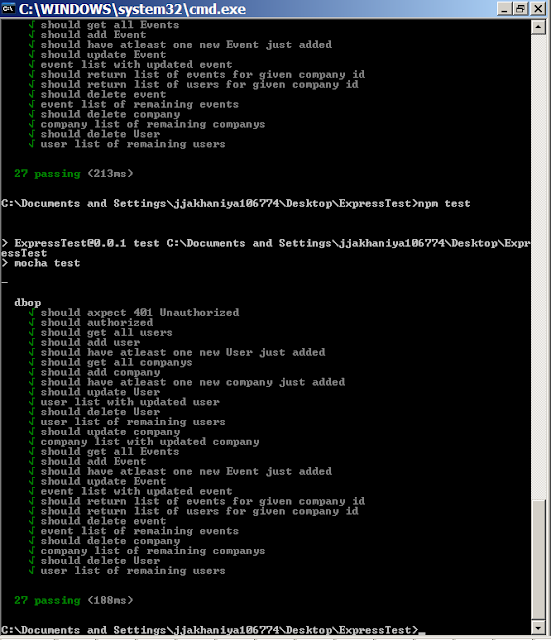REST Full API Test case with Mocha in Nodejs
First of all install mocha globally on your node server.
npm install -g mocha
We will also use some more modules to write a test case install that modules also by below steps.
npm install --save supertest
npm install --save assert
npm install --save should
Now create test folder in your project by writing
mkdir test
Now place your testCase.js file in side this folder
Now to run test just write below command
mocha
If you want to run test case using "npm test" command then create file named makefile without any extension and put below code in that file
test:
@./node_modules/.bin/mocha
.PHONY: test
Then add the following lines to your package.json file:
----------------------------------------------------------------------
testCase.js file
----------------------------------------------------------------------
var assert = require('assert');
var request = require('supertest');
var age = request.agent();
var should = require('should');
var recentevent = "";
var recentuser = "";
var recentcompany = "";
describe('dbop', function () {
it('should axpect 401 Unauthorized', function (done) {
request("localhost:3000")
.get("/users")
.expect(401) //Status code
.end(function (err, res) {
if (err) {
throw err;
}
done();
});
});
function loginUser() {
return function (done) {
request("localhost:3000")
.post('/users')
.set("Authorization", "basic " + new Buffer("TESTUS:passkey").toString("base64"))
.expect(200)
.end(onResponse);
function onResponse(err, res) {
if (err)
return done(err);
return done();
}
};
}
it('should authorized', loginUser());
function getAllUser() {
return function (done) {
request("localhost:3000")
.get("/users")
.set("Authorization", "basic " + new Buffer("TESTUS:passkey").toString("base64"))
.set('accept', 'application/json')
.expect(200) //Status code
.end(function (err, res) {
if (err) {
throw new Error("error");
}
res.should.have.body;
console.log(res.body);
done();
});
}
}
it('should get all users', getAllUser());
it('should add user', function (done) {
request("localhost:3000")
.post("/users")
.set("Authorization", "basic " + new Buffer("TESTUS:passkey").toString("base64"))
.set('accept', 'application/json')
.send({
"user_name" : "testUser",
"passkey" : "testKey",
"companyid" : "10"
})
.expect(200) //Status code
.end(function (err, res) {
if (err) {
throw new Error("error");
}
// Should.js fluent syntax applied
//res.body.should.have.property('id');
res.should.have.body;
console.log(res.body);
recentuser = res.body.id;
//.should.not.equal(null);
//res.body.passkey.should.not.equal(null);
done();
});
});
});
Result:
Source code available at https://github.com/jayesh36/RESTFull-API-with-express-knex-promises-with-testcase-in-mocha/tree/master/test
First of all install mocha globally on your node server.
npm install -g mocha
We will also use some more modules to write a test case install that modules also by below steps.
npm install --save supertest
npm install --save assert
npm install --save should
Now create test folder in your project by writing
mkdir test
Now place your testCase.js file in side this folder
Now to run test just write below command
mocha
If you want to run test case using "npm test" command then create file named makefile without any extension and put below code in that file
test:
@./node_modules/.bin/mocha
.PHONY: test
Then add the following lines to your package.json file:
"scripts": {
"test": "make test" // OR mocha test
}
"test": "make test" // OR mocha test
}
----------------------------------------------------------------------
testCase.js file
----------------------------------------------------------------------
var assert = require('assert');
var request = require('supertest');
var age = request.agent();
var should = require('should');
var recentevent = "";
var recentuser = "";
var recentcompany = "";
describe('dbop', function () {
it('should axpect 401 Unauthorized', function (done) {
request("localhost:3000")
.get("/users")
.expect(401) //Status code
.end(function (err, res) {
if (err) {
throw err;
}
done();
});
});
function loginUser() {
return function (done) {
request("localhost:3000")
.post('/users')
.set("Authorization", "basic " + new Buffer("TESTUS:passkey").toString("base64"))
.expect(200)
.end(onResponse);
function onResponse(err, res) {
if (err)
return done(err);
return done();
}
};
}
it('should authorized', loginUser());
function getAllUser() {
return function (done) {
request("localhost:3000")
.get("/users")
.set("Authorization", "basic " + new Buffer("TESTUS:passkey").toString("base64"))
.set('accept', 'application/json')
.expect(200) //Status code
.end(function (err, res) {
if (err) {
throw new Error("error");
}
res.should.have.body;
console.log(res.body);
done();
});
}
}
it('should get all users', getAllUser());
it('should add user', function (done) {
request("localhost:3000")
.post("/users")
.set("Authorization", "basic " + new Buffer("TESTUS:passkey").toString("base64"))
.set('accept', 'application/json')
.send({
"user_name" : "testUser",
"passkey" : "testKey",
"companyid" : "10"
})
.expect(200) //Status code
.end(function (err, res) {
if (err) {
throw new Error("error");
}
// Should.js fluent syntax applied
//res.body.should.have.property('id');
res.should.have.body;
console.log(res.body);
recentuser = res.body.id;
//.should.not.equal(null);
//res.body.passkey.should.not.equal(null);
done();
});
});
});
Result:
Source code available at https://github.com/jayesh36/RESTFull-API-with-express-knex-promises-with-testcase-in-mocha/tree/master/test

No comments:
Post a Comment